Collection
Date
Location
Type
120 results
Remembering 1807
In 1807 Britain legally abolished the slave trade, although it continued to participate in and profit from the institution of slavery. In 2007 the British government committed public funds to mark the bicentenary of the Slave Trade Act. The Remembering 1807 project has collected and archived material relating to the many events and activities that took place during 2007. These records help us to locate and understand the place of slavery, the slave trade and its abolition in the UK’s public history, commemorative traditions and popular memory. Background to the collection...
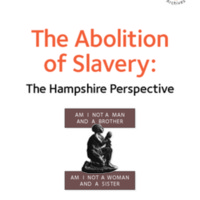
The Abolition of Slavery: The Hampshire Perspective
A touring exhibition exploring Hampshire's links with slave ownership and the abolition campaign was produced by (and featured material from) Hampshire Museums and Archives Service and Hampshire Record Office. The exhibition was on show in the Record Office foyer, before travelling to museums,…
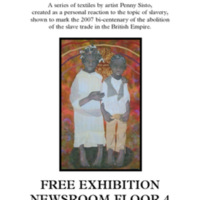
Threads of Strength and Fortitude
Threads of Strength and Fortitude was an exhibition of a series of textiles by artist Penny Sisto, created as a personal response to the bicentenary. The quilts were shipped over from New Albany, Indiana, and exhibited at the Royal Armouries in Leeds. Eight quilts explored the theme of slavery…
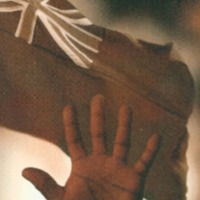
Chasing Freedom: The Royal Navy and the Suppression of the Transatlantic Slave Trade
An exhibition at the Royal Naval Museum at Portsmouth Historic Dockyard explored the role of the Royal Navy squadron established after 1807 to patrol the West African coast and suppress the transatlantic slave trade. Using illustrations, contemporary accounts and original diaries of Royal Navy…
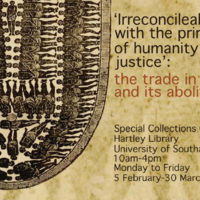
'Irreconcilable with the principles of justice and humanity': the trade in slaves and its abolition
An exhibition held in the Special Collections Gallery at the Hartley Library, University of Southampton. The exhibition took a broad view of the subject of transatlantic slavery across the 18th and 19th centuries, featuring accounts of the horrors of the transatlantic slave trade, the case for…
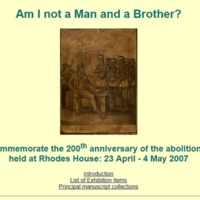
Am I Not a Man and a Brother?
‘Am I Not a Man and a Brother?’, an online exhibition to mark the bicentenary, was launched by the Bodleian Library of African and Commonwealth Studies at Rhodes House. Some of the items were also on view in an exhibition at Rhodes House in April and May 2007. The exhibition included manuscripts…
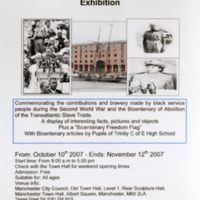
Wartime Black History and the Bicentenary
An exhibition by Manchester City Council held at Manchester Town Hall commemorated the contributions of Black service people during World War II. The exhibition also included the Bicentenary Freedom Flag, to mark commemorations of the Abolition Act of 1807. Alongside exploring the efforts of women,…
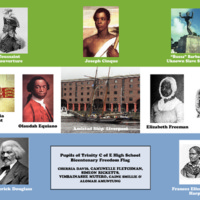
Bicentenary Freedom Flag
The Bicentenary Freedom Flag was displayed alongside an exhibition about Wartime Black History at Manchester Town Hall. The project was a collaboration between staff from Manchester City Council Corporate Services Black Staff Group and pupils of Trinity Church of England School in Manchester. The…
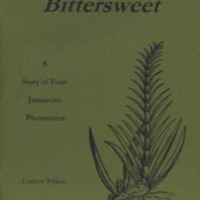
Bittersweet
The Bittersweet exhibition was held during the summer of 2007 at Tissington Hall, Derbyshire, home of the FitzHerbert family since the 17th century. The exhibition and accompanying booklet by Frances Wilkins describe life, work and slavery on four Jamaican sugar plantations inherited by the…
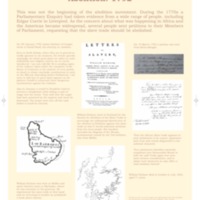
Dumfries and Galloway and the Transatlantic Slave Trade
An exhibition exploring the connections between the Scottish region of Dumfries and Galloway and the transatlantic slave trade toured Dumfries Museum, the Stewartry Museum in Kirkcudbright and Stranraer Museum. At each venue, the exhibition was accompanied by displays of material and a lecture. The…
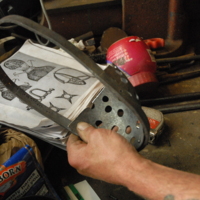
Sugar Coated Tears
This exhibition explored the links between industry in the West Midlands and the commercial gains of slavery. Wolverhampton's role as a manufacturer of iron was crucial to the economy of slavery, as implements of restraint and punishment were needed to repress those who fought their enslavement. The…
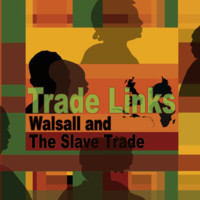
Trade Links: Walsall and the Slave Trade
An exhibition at Walsall Museum looked at Walsall's links with the slave trade, the background to the Abolition Act of 1807, and the legacies of slavery. Walsall's metal industry included chain making by local women of Cradley Heath, and the manufacture of guns used to trade for captive Africans.…
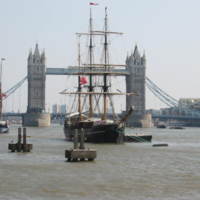
Spirit of Wilberforce
The Centre for Contemporary Ministry (CCM) is an educational charity specialising in the study of contemporary social issues. The CCM established a slavery exhibition at their base, Moggerhanger Park in Bedfordshire, once country home of members of the Thornton family, cousins of William…
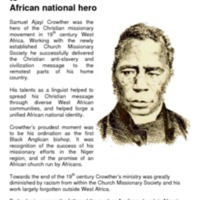
Samuel Ajayi Crowther: From slave boy to African national hero
Samuel Ajayi Crowther was Britain's first Black Anglican Bishop. He was born in Yorubaland, part of modern South Western Nigeria. After being enslaved, he was rescued at sea by the Royal Navy and began his missionary education in Sierra Leone. Crowther studied in Islington on two separate occasions:…
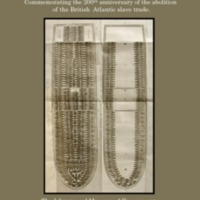
Squaring the Triangle: Freemasonry and Anti-Slavery
The exhibition at the Library and Museum of Freemasonry to mark the bicentenary arose from a project to catalogue their historical collections relating to Masonic history in the West Indies and America between 1760 and 1900. This period covers the establishment of African Lodge, the first Masonic…
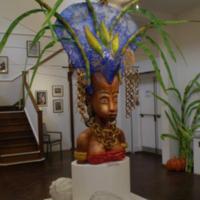
Parallel Views: Black History in Richmond
The Parallel Views exhibition and its associated community engagement programme explored the relevance of the bicentenary for communities in the London Borough of Richmond upon Thames, uncovering local associations with slavery and its abolition. It also told the parallel story of twin town…
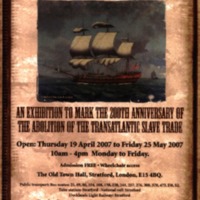
The Wickedest of Cargoes
London Borough of Newham Council led “The Wickedest of Cargoes…”, an exhibition at Stratford Town Hall, which used local museum and archive collections to explore the history of the slave trade and abolition. It looked at the history of slavery through different societies and cultures, and…
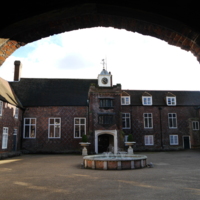
Faces of Freedom: Hammersmith and Fulham and the Slave Trade
The Museum of Fulham Palace is housed in the former palace of the Bishops of London, and former home of Bishop Porteus, the leading advocate for abolition within the Church of England in the late 18th and early 19th centuries. The Faces of Freedom exhibition featured Porteus alongside other…
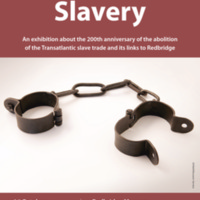
Redbridge and Slavery
Redbridge Museum's exhibition to mark the bicentenary examined the London Borough of Redbridge's connections to the slave trade and abolition. These links included local resident Josiah Child, once Governor of the East India Company, an investor in the Royal African Company and owner of plantations…
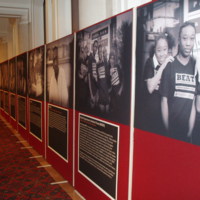
Freedom Roads
The Freedom Roads exhibition at Guildhall Art Gallery was one of several initiatives led by London Metropolitan Archives to mark the bicentenary. The exhibition featured contemporary photographic portraits of people of African origin whose work has contributed to the continuing struggle for human…
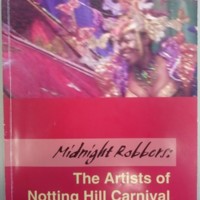
Midnight Robbers: The Artists of Notting Hill Carnival
Midnight Robbers was exhibited at City Hall, London in 2007 and the Ohio State University Urban Art Space in 2008. The exhibition explored the historic context of Notting Hill Carnival and examined the Carnival art form. The London exhibition also marked the bicentenary of the Abolition Act.…